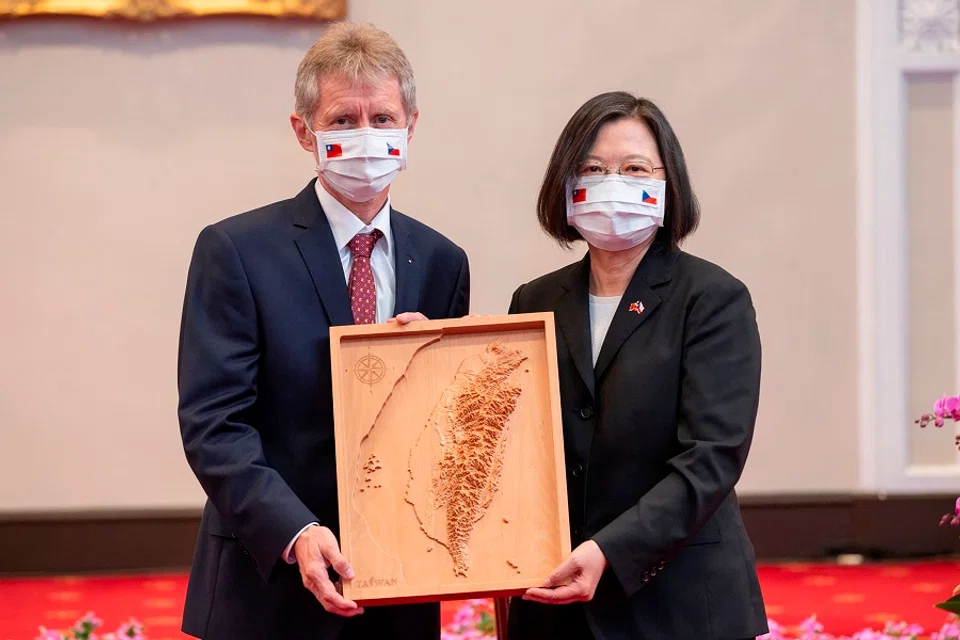Failed 'coercive diplomacy'? Beijing might harden its stance on Taiwan after Czech delegation's visit
Was the recent visit of a Czech delegation led by Senate speaker Miloš Vystrčil penny wise but pound foolish? Zhou Wenxing analyses that the Czech visit may encourage further visits by democratic countries in a show of solidarity, but it is just such visible moves that might make Beijing go on the offensive.

"I am Taiwanese," said visiting Czech Senate Speaker Miloš Vystrčil in a speech at the Legislative Yuan in Taipei on 1 September 2020, echoing former US President John F. Kennedy's proclamation of "Ich bin ein Berliner" (I am a Berliner) to express his support for the democracy and freedom of Taiwan. Accompanied by a high-profile delegation of around 90 members, including Prague Mayor Zdeněk Hřib, Vystrčil arrived at Taipei on 30 August, despite opposition from the president and prime minister of the Czech Republic and warnings from the Chinese government.
According to the constitutional law of the Czech Republic, which has a bicameral legislature, the Senate speaker is the second-highest ranking official in the country. Vystrčil's trip makes him the first incumbent parliament leader and also the highest-level Czech politician that has visited the island to date. The visit, particularly the speaker's meeting with Taiwanese leader Tsai Ing-wen, has put both the small Central European country and the island into the limelight. As the world is now grappling with the Covid-19 pandemic, the visit deserves more notice.
Vystrčil's trip has been made possible due to multiple factors which fall into three levels under the level-of-analysis approach that is widely utilised in political science and international relations.
Vystrčil expressed his sympathy for Taiwan's pursuit of democracy and freedom, and urged democracies to stand in unity against the strong and powerful - referring to the Communist Party of China...

The individual level
Almost all members of the delegation share and suffer from the memories of living in Czechoslovakia that was controlled by the communist Soviet Union. Vystrčil expressed his sympathy for Taiwan's pursuit of democracy and freedom, and urged democracies to stand in unity against the strong and powerful - referring to the Communist Party of China - during a speech he gave at National Chengchi University in Taipei on 31 August.
On the Taiwan issue, they tend to develop closer ties with Taiwan while challenging the one-China policy that the Chinese government imposed.
Apart from having memories of the old days of Czechoslovakia, Hřib was once an intern in Taiwan when the island just achieved its second peaceful turnover of a political party one year ago. He fell in love with the island and referred to himself as a "Taiwan fan". After taking office as the Prague mayor in late 2018, Hřib scrapped the capital's sister-city agreement with Beijing in October 2019 and signed a new one with Taipei.
Vystrčil and Hřib's staunch support for Taiwan also relates to their liberal political parties - Civic Democratic Party (ODS) and Czech Pirate Party, respectively. The two parties pay more attention to values (freedom and democracy) vis-à-vis money (economy and investment). On the Taiwan issue, they tend to develop closer ties with Taiwan while challenging the one-China policy that the Chinese government imposed.

The state level
There are two opposing political camps, with one advocating values-oriented diplomacy and another emphasising pragmatism in foreign affairs. Their competition over the country's diplomacy has made the Taiwan issue a battleground since the 1990s when Václav Havel, the first president of Czech Republic and originator of values-based diplomacy, adopted a pro-Taiwan policy during his presidency. ODS and Czech Pirate Party, among others, are carrying on Havel's diplomatic legacy.
The death of Jaroslav Kubera, Vystrčil's predecessor, who planned to visit Taiwan in January 2020, allegedly had something to do with Chinese pressures.
The current President Miloš Zeman is more practical. A representative of the pro-mainland Chinese camp, Zeman has endorsed the one-China policy and has been calling for the Czech Republic to develop closer ties with Beijing since his assumption of office in 2013. But the decline of China's investment in the Czech Republic has given the opposition camp an opportunity to attack Zeman and his pro-China initiatives. Czech-China relations have soured considerably since then.
Hřib's anti-China policy measures, such as flying Tibetan flags from city hall, led to Beijing's retaliatory move of banning the Prague Philharmonic Orchestra from touring China, which further stirred up anti-China sentiments in Czechs who are extremely vigilant against communism. The death of Jaroslav Kubera, Vystrčil's predecessor, who planned to visit Taiwan in January 2020, allegedly had something to do with Chinese pressures. This brought the damaged bilateral ties to a lowest point the past decades have witnessed.
Nearly 60% of Czechs hold an unfavourable view of China, making the country one of the most anti-China in Europe. - 2019 Pew Research Center survey

As revealed by the latest Pew Research Center survey in 2019, nearly 60% of Czechs hold an unfavourable view of China, making the country one of the most anti-China in Europe. As unfavourable opinion toward China grows, opposition and small political parties in particular are finding it lucrative to criticise China. The competition between the two camps has created more space for pro-Taiwan politicians to take full advantage of.
The international system level
As US-China ties deteriorated sharply, the US has invested more to force the third countries to choose sides between the two powers. The Czech Republic is obviously making its inclinations known amid the strategic rivalry between the US and China.
US Secretary of State Mike Pompeo visited the Republic and gave an anti-communism speech in the Senate on 12 August - two weeks before Vystrčil's Taiwan visit - calling for cooperation among democracies to defend against the so-called China threat and praising Vystrčil's efforts to deepen connections with Taiwan.
It also should be noted that the Czech delegation's visit to Taiwan came just a week after the visit to Taiwan by Alex Azar, US Secretary of Health and Human Services. As the highest-level sitting official visiting Taiwan since 1979 when the US switched its diplomatic recognition to Beijing, Azar has set an example for the Czech delegation.

While the outbreak and spread of the Covid-19 pandemic have intensified US-China competition, Taiwan's proactive conduct of "mask diplomacy" has bought it some friends. Taipei donated a large amount of protective masks and ventilators to the Czech Republic, who signed a cooperative agreement with Taipei in return on the epidemic, making it the first European country to forge such a partnership with Taiwan.
A dangerous road ahead?
The visit by the Czech delegation has received quite a warm welcome from Taiwan's political and business circles. Tsai Ing-wen and her colleagues as well as the pan-Green media hype up the visit as Taiwan's "huge diplomatic progress". Indeed, for the independence-leaning Democratic Progressive Party authorities, the visit means a lot to Taiwan. But they must think carefully about the next step after the visit.
One of the core questions facing both Beijing and Taipei is whether there will be other democratic countries visiting Taiwan in the near future as called for by Vystrčil. The prospect largely hinges on how Beijing will react to the Czech delegation's visit. As Chinese Foreign Minister Wang Yi said, the delegation shall pay a "heavy price" for its "short-sighted behaviour". But Beijing now seems to be facing a dilemma in dealing with this tricky issue. Czech Foreign Minister Tomáš Petříček, who opposed Vystrčil's visit plan, has made the criticism that Wang's remarks had "crossed the line". Any harsher countermeasures by China will certainly backfire and alienate more pro-China people.
In fact, the Czech delegation's successful visit has already indicated the failure of China's "coercive diplomacy".

Yet as its core interest and a matter of principle, the Taiwan issue is one that Beijing can make no concession on. As the rhetoric of reunification with Taiwan by use of force gains popularity on the Chinese mainland, Beijing will be confronted with more pressures. Any soft response might be interpreted as showing weakens and thus endanger the Communist party's ruling legitimacy. In fact, the Czech delegation's successful visit has already indicated the failure of China's "coercive diplomacy". In order to deter more countries from visiting Taiwan, Beijing is expected to adopt more strict policies, despite the prospect of worsening relations with other countries.
The high-profile visit by Czech politicians and businessmen might mark a turning point in world politics that has changed fundamentally and which is accelerated by the pandemic. As for Taipei, is it well prepared to start a diplomatic war and even a military conflict with Beijing? The Taiwan issue will eventually be solved by both sides across the Taiwan Strait. Taipei's efforts to drag in international players will achieve nothing but put itself in danger. A better future for the island is to maintain a balanced policy toward Beijing on the basis of the "diplomatic truce" that is proposed by the former leader Ma Ying-jeou.



![[Photos] Fact versus fiction: The portrayal of WWII anti-Japanese martyrs in Taiwan](https://cassette.sphdigital.com.sg/image/thinkchina/3494f8bd481870f7c65b881fd21a3fd733f573f23232376e39c532a2c7593cbc)

